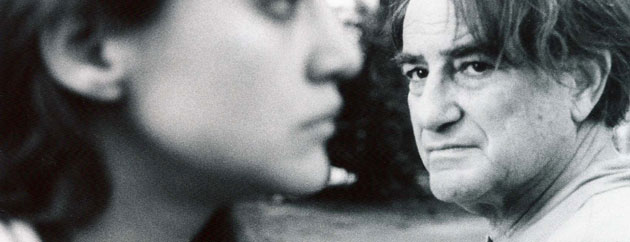
The Mugger
17 April, 2012The Mugger (El Asaltante) is a story based on a real event which the director, Pablo Fendrik, read in a local newspaper. The assailant of the title was never caught, and likewise, in the film, we can only guess at the motives behind the threats of violence and brutality.
Under the name of Alejandro Williams, Arturo Goetz’s character enters school on the pretence of enrolling his son there. Just as he is about to discuss a payment plan he clearly and calmly states:
“I have come to rob this school. This is a 9mm with a silencer. I could shoot you and no one would know.”
This seems to come out of nowhere and it takes a moment for us to react to this grandfatherly figure making credible threats in almost charming tones. Unfortunately for him, the safe is actually in another room, but he is prepared for some minor straying from his plan. The staff member tries not to lose her cool and cooperates. Our character leaves the school a few sizeable handfuls of cash the richer while he tries to suppress a cheeky grin showing that he is very pleased with himself.
He then gets on a bus, as if nothing has happened, and goes to the bank to deposit his winnings. Still as cool as a cucumber, he heads to a café for a cup of tea and to phone his wife and his friend about some more trivial matters.
The style of The Mugger is quite distinctive. It is only short (at 70 minutes), has no soundtrack and little to no dialogue. In many ways it echoes Robert Bresson’s similarly brief Pickpocket where the intricate process of carrying out a crime is detailed for all its perverse aesthetic beauty. Unlike Pickpocket however, we are given none of the internal workings of the criminal, that is left for us to decide through close up shots which study the actors’ faces.
Many of the shots are also long uninterrupted takes, which are evidence of careful choreography just behind the camera and show that one doesn’t need a big budget to create drama, compelling characters and an interesting style. This is yet another way in which Latin American film on a budget can compete on the world’s stage.
Pablo Fendrik was asked by distributors to shoot another 10 minutes to the film to make it more suitable for general release but refused on the grounds that he wanted to show the story as he saw it and wasn’t prepared to change. This is perhaps why the film, which was released in 2007, has found it hard to gain the recognition it deserves.
But why bother filling out a perfectly formed work with the onscreen equivalent of waffle, just to match up to an arbitrary acceptable duration? It is unlikely that audiences would see it as poor value for money, nor rush to the box office for a refund. Bresson saw no need to labour the point of a film, many of Bergman’s films were around or under the 90 minute mark and even Hitchcock said that the length of a film should correspond to the endurance of the human bladder.
As the film progresses, the unnamed protagonist’s carefully laid plans start to unravel. Unpredictable elements come in to hamper his progress. At first he is able to adapt and continue to run smoothly but the close camera work lets us see him gradually become more flustered. He knows that the key to not being suspicious is to remain calm, but he just can’t help but panic and cause himself some insurmountable problems.
Watching The Mugger feels like watching the first half of an episode of Columbo. We keenly watch the criminal arrogantly commit their crime, trying to guess at the tiny detail which they have left out, and which will ultimately be their undoing.
Unlike Columbo however, we will never know our bad guy’s motives and will just have to make do with revelling in the quality of the unfolding act itself.
The Mugger is showing as part of the 1st Argentine Film Festival of London, which will be taking place between April 19th-22nd at the Ritzy Picturehouse in Brixton. See argentinefilmfestival.com for more details.
Follow Sounds and Colours: Facebook / Twitter / Instagram / Mixcloud / Soundcloud / Bandcamp
Subscribe to the Sounds and Colours Newsletter for regular updates, news and competitions bringing the best of Latin American culture direct to your Inbox.

